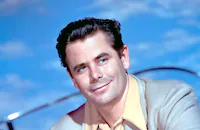The Last Challenge

Brief Synopsis
Cast & Crew
Richard Thorpe
Glenn Ford
Angie Dickinson
Chad Everett
Gary Merrill
Jack Elam
Film Details
Technical Specs

Synopsis
In 1877, young Lot McGuire rides toward the Southwestern town of Suwora, intending to kill Marshal Dan Blaine and thereby prove himself the fastest draw in the territory. By chance, he meets and becomes friendly with his intended victim at a fishing spot outside of town but makes his intentions clear to the marshal. Blaine, a former gunfighter pacified by 10 years in prison, sees in McGuire the kind of youngster he himself once was and tries unsuccessfully to make him forget his so-called "mission." After McGuire proves his ability by outdrawing card cheat Squint Calloway, Blaine's dancehall hostess girl friend, Lisa Denton, hires gunman Ernest Scarnes to kill him. McGuire mortally wounds his would-be assassin, however, and confronts Lisa with knowledge of her treachery, although he promises not to divulge it after learning that she was only trying to protect Blaine. As the showdown nears, the desperate Lisa takes a revolver and stalks McGuire herself, but before she can shoot, Blaine stops her; aware now that a duel is inevitable, the marshal outdraws his challenger, tosses away his gun, and sadly leaves town alone.

Director

Richard Thorpe
Cast

Glenn Ford

Angie Dickinson

Chad Everett

Gary Merrill
Jack Elam
Delphi Lawrence

Royal Dano
Kevin Hagen
Florence Sundstrom
Marian Collier
Robert Sorrells
John Milford
Frank Mcgrath
Amanda Randolph

Bill Walker
Letitia Paquette
Beverly Hills
Jack Bighead
Henry O'brien
George Little Buffalo
Eddie Little Sky
Crew
George W. Davis
Richard Farrell
Ellsworth Fredricks
Robert Emmett Ginna
Henry Grace
Hugh Hunt
Mary Keats
Urie Mccleary
Franklin Milton
John Sherry
Richard Shores
Eric Von Stroheim Jr.
Marvin Stuart
Richard Thorpe
William Tuttle

Videos
Movie Clip



Trailer
Hosted Intro



Film Details
Technical Specs

Articles
The Last Challenge
In fact, The Last Challenge was Thorpe's last movie. He retired afterwards to Palm Springs at the age of 71, and he died in 1991 at age 96. Thorpe is not a director who is often written about or remembered today, for the simple reason that most of his movies were unmemorable. He turned out likable and often profitable genre films with no real personal imprint. Perhaps the most interesting fact about him is that he was one of the most prolific directors ever to work in Hollywood. In 44 years, stretching from the peak of the silent era to a made-for-television movie, Thorpe directed 179 features. By comparison, Michael Curtiz directed 164 films and John Ford made 132. Only William Beaudine directed more (182), and as Shawn Levy has written, "even a charitable eye notes that Beaudine was making Bowery Boys comedies and sex education films at a time when Thorpe was working with Joan Crawford, Spencer Tracy, James Stewart and Elizabeth Taylor."
Still, the fact is that in most cases, the pictures Thorpe made with these stars wound up being among their most minor credits. James Mason famously (and bluntly) explained this oddity by saying of Thorpe, "His reputation for only needing one take is why we don't remember his films." Thorpe did work quickly, often covering scenes in only master shots - a purely functional method of directing. It stands to reason, however, that if you make 179 movies, there are bound to be some good ones in there somewhere. Thorpe worked in all genres, and there are a few quite decent credits on his resume, such as Night Must Fall (1937), Cry Havoc (1943), Ivanhoe (1952) and Jailhouse Rock (1957), one of Elvis Presley's best films. His sheer longevity at MGM also created a steady cash flow for the studio; studio executive Benny Thau once told Thorpe that he had made more money for MGM than any other director.
Co-star Angie Dickinson made The Last Challenge immediately after filming John Boorman's neo-noir masterpiece Point Blank (1967). The very solid supporting cast includes Western favorites Royal Dano (Bend of the River (1952), Johnny Guitar (1954), Man of the West, 1958) and Jack Elam (Once Upon a Time in the West (1968), Support Your Local Sheriff, 1969).
Producer/Director: Richard Thorpe
Screenplay: Albert Maltz (also novel), Robert Emmett Ginna
Cinematography: Ellsworth Fredericks
Film Editing: Richard Farrell
Art Direction: George W. Davis, Urie McCleary
Music: Richard Shores
Cast: Glenn Ford (Marshal Dan Blaine), Angie Dickinson (Lisa Denton), Chad Everett (Lot McGuire), Gary Merrill (Squint Calloway), Jack Elam (Ernest Scarnes), Delphi Lawrence (Marie Webster).
C-96m. Letterboxed.
by Jeremy Arnold

The Last Challenge
Quotes
Of all the people I know who ain't worth saving, you're the first one to come to my mind.- Marshal Dan Blaine
He was a no good drifter. He'd steal the pennies off a dead man's eyes.- Marshal Dan Blaine
Trivia
Notes
Location scenes filmed in Tucson and Palmdale, Arizona. Working title: Pistolero.

Miscellaneous Notes
Released in United States Fall October 1967
Released in United States Fall October 1967














